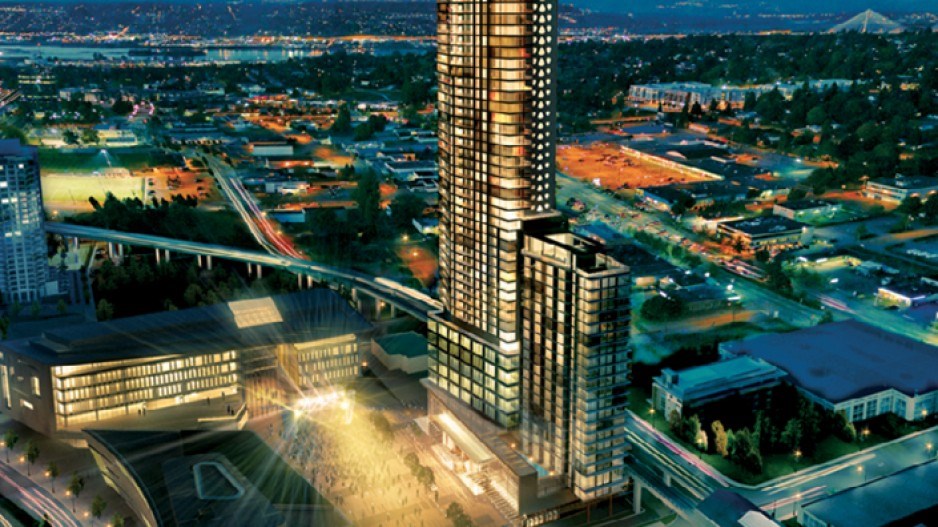This is the first in a two-part series investigating critiques of how Metro Vancouver municipal governments allow development. Next week’s instalment focuses on Vancouver.
The CEO of the Surrey City Development Corp. (SCDC) shrugs off critics’ suggestions that his organization is competing with private developers and putting taxpayer money at risk.
“Our mandate is to make money,” Aubrey Kelly told Business in Vancouver. “In these days of ever-increasing pressures on the public purse, the leadership at the City of Surrey has realized that you can’t take it off the back of the taxpayer all the time.”
Some real estate watchers, including Real Estate Investment Network CEO Don Campbell, like this approach.
Campbell believes the projects of the SCDC, the City of Surrey’s wholly owned development company, have been solid and pointed to the organization’s profits in 2012 ($4.9 million) and 2013 ($6.1 million).
SCDC critics include Geller Group owner Michael Geller and civic activists such as former mayoral candidate Ross Buchanan and two-time council candidate Grant Rice.
Developer and Beedie Group CEO Ryan Beedie told BIV that, a few years ago, he had concerns about the SCDC competing with private developers.
But his view of the organization has changed. Beedie is now looking forward to potentially partnering with the SCDC on some industrial projects in Campbell Heights.
Other developers partnering with the SCDC include Century Group, which has a majority stake in a 52-storey residential tower that will have 353 suites, a 144-room hotel and five floors of office space.
The SCDC provided land and capital in exchange for a 30% stake in the 3 Civic Plaza project, which is located near the Surrey Central SkyTrain station, the library, an SFU campus and the new city hall.
SCDC is also partnering with 152 St Holdings in a proposed 26-storey tower and a 19-storey tower in Semiahmoo as part of a project that would include a 350-seat performing arts centre.
But Geller questioned the SCDC’s involvement in private development.
“The purpose and activities of a municipally owned development corporation should be different than a private development corporation,” said Geller, who was on the SCDC’s board until he resigned in 2010.
Back then the concept of cities getting involved in developments was extremely controversial. Vancouver was grappling with how to sell hundreds of units in the troubled Olympic Village development, which was completed thanks to city assurances for financing when the project fell into receivership.
“I was concerned at the time that the SCDC was undertaking projects that might be very risky,” Geller said. “One of those projects was a purpose-built brew pub on city land.”
Kelly defended the $35 million, 65,000-square-foot brew pub that the SCDC built for Central City Brewing Co. on city land as a profitable initiative.
“There’s a misnomer out there that somehow the city gave Central City Brewing a building,” he said. “We didn’t. We’re the landlord. We own the building. We have a tenant who is paying market rent, and we’re making market returns for building the building.”
Kelly would not reveal exact details of the lease agreement because he said it’s “private” information relating to a private business.
But that lack of transparency concerns critics.
“What is our liability if Molson Coors [Brewing Co.] believes they don’t like Central City operating and think the brewery is getting too big?” asked Rice. “They could buy the brewery and close it down. We would end up with a built-to-suit brewery and no tenant.”
Other concerns about the SCDC is that it puts the city in the awkward position of being both a developer and the governing body responsible for listening to public concerns about projects.
Semiahmoo residents have formed Semiahmoo Against Towers and blasted councillors at meetings related to the area’s official community plan.
Rice said there is an inherent conflict with the city seeking to make money from building towers in the area.
“That’s why we’re an arms-length organization,” Kelly countered. “We are treated at the planning counter just like any other developer is. We expect that. We want that to actually remove the perception that maybe somehow we have an inside track to approvals. It’s just not the case.” •




